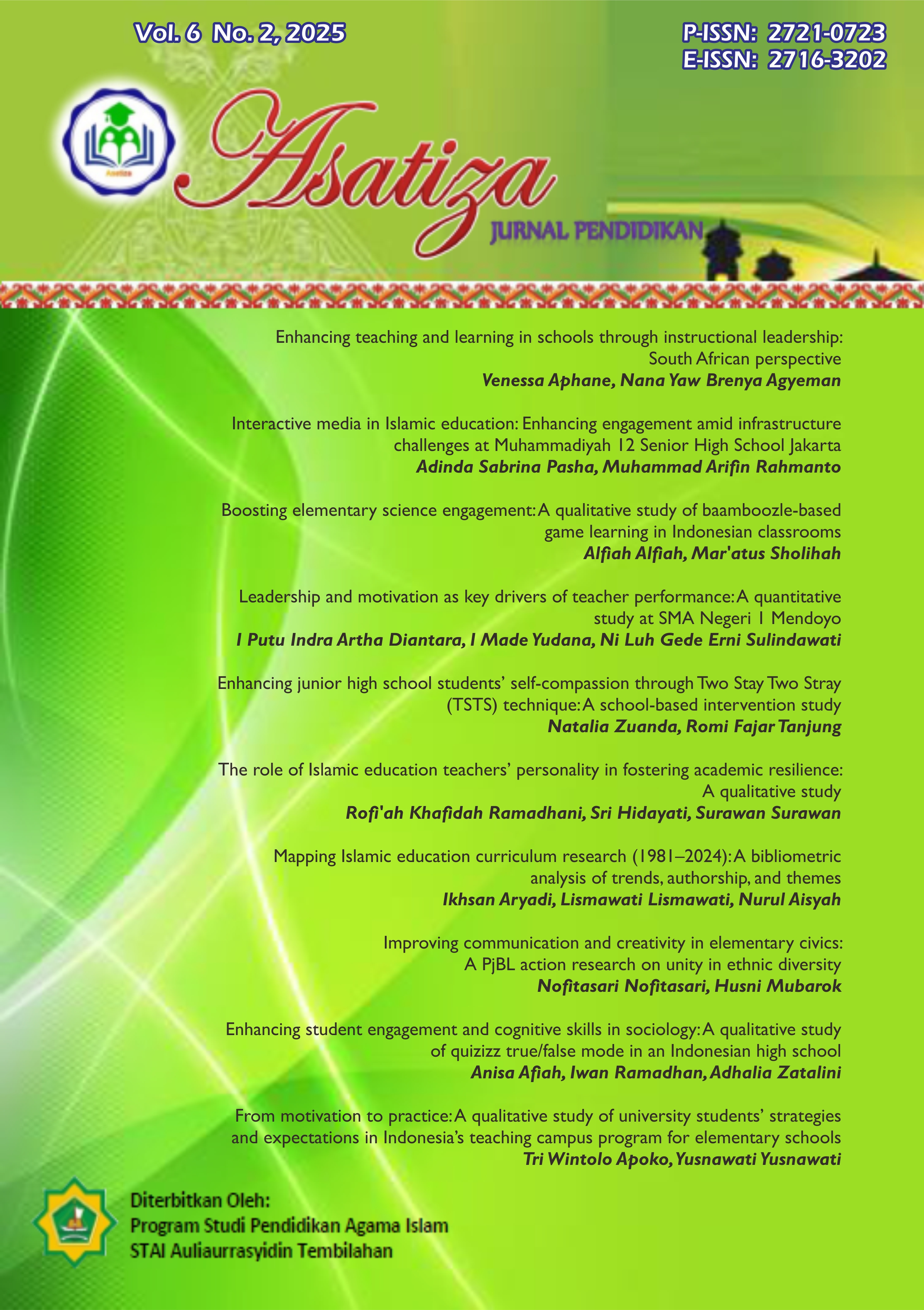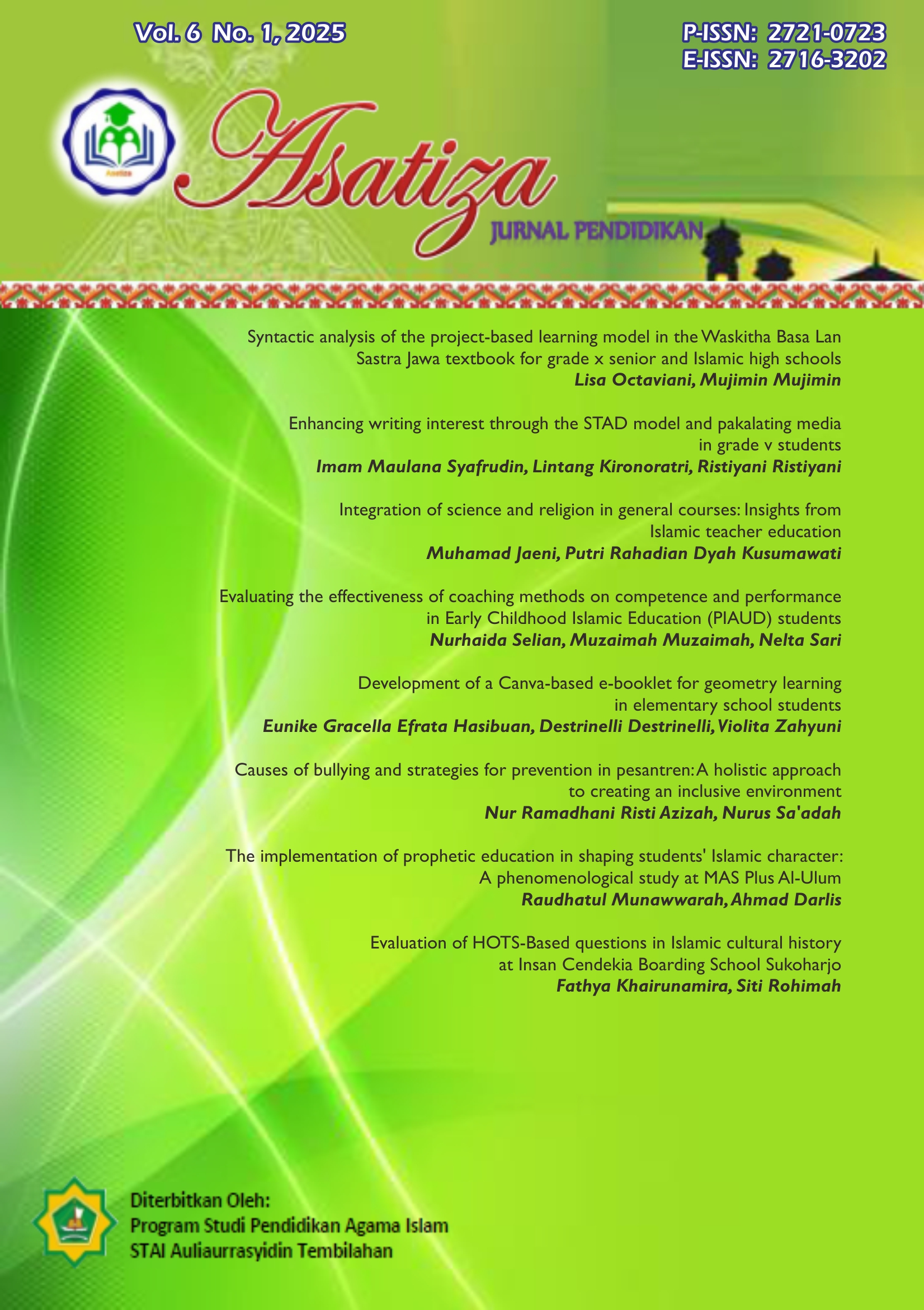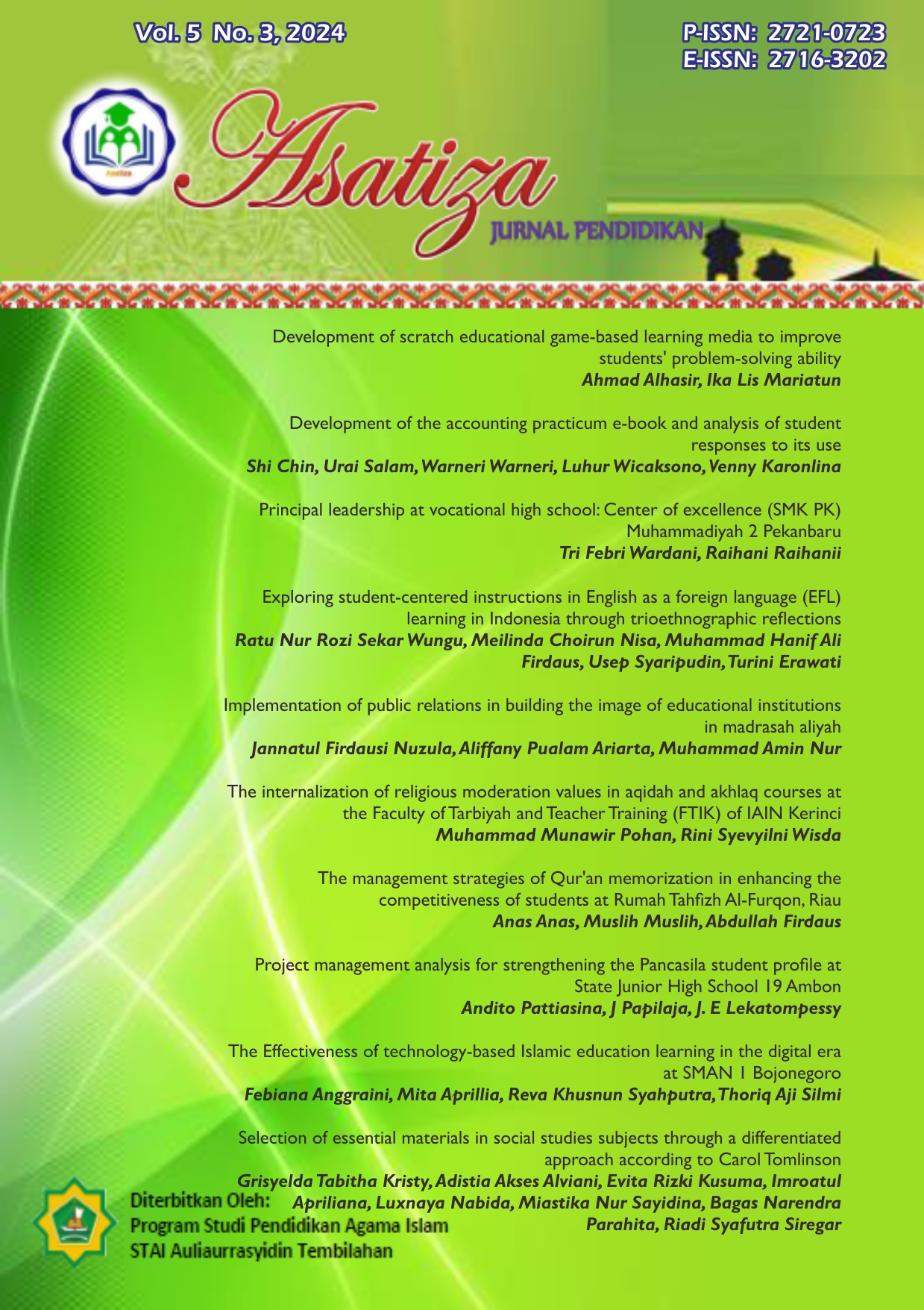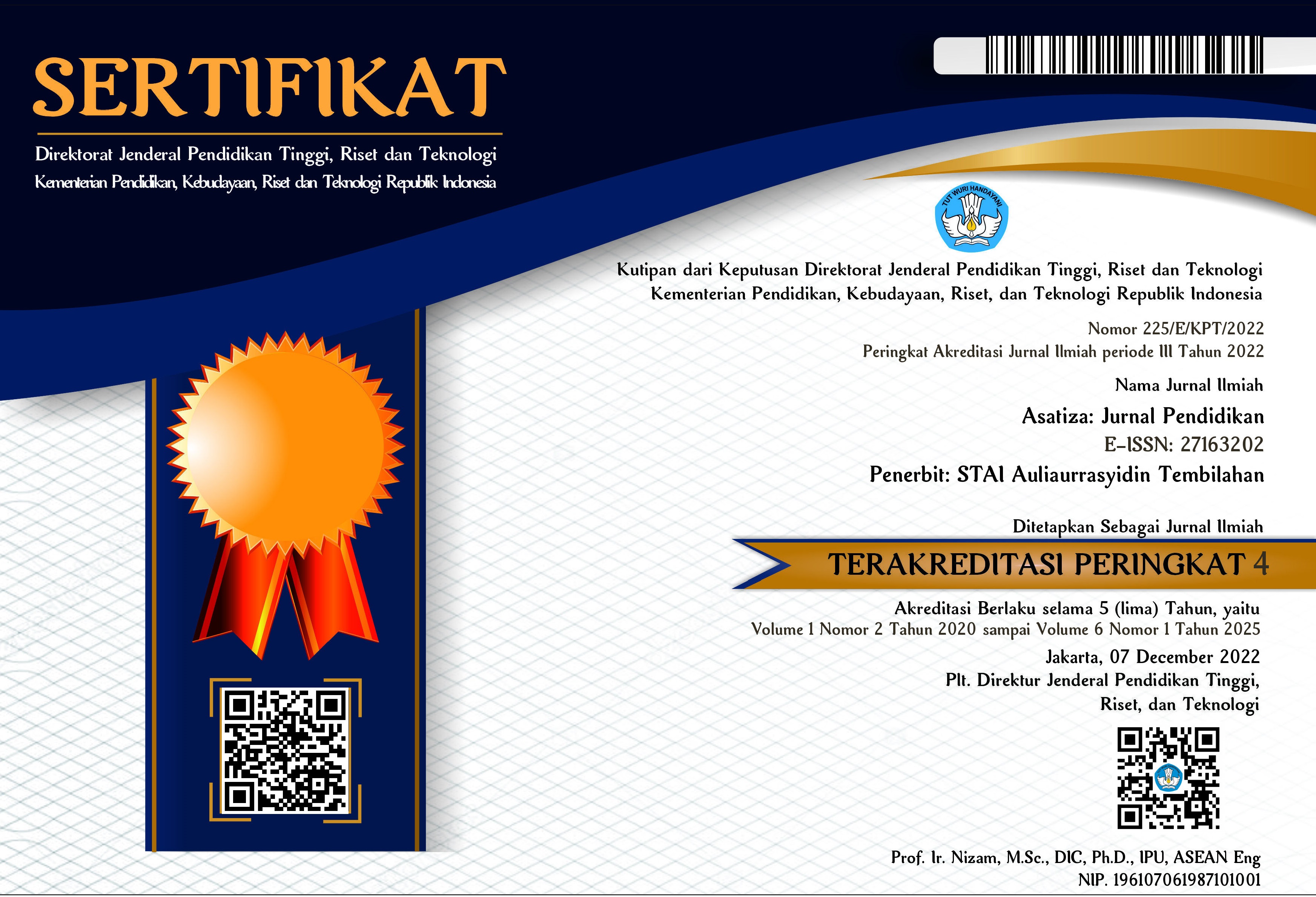| E-ISSN | P-ISSN |
Archives
-

Asatiza: Jurnal Pendidikan
Vol. 6 No. 2 (2025)This groundbreaking issue of Asatiza: Jurnal Pendidikan (Vol. 6, No. 2, May 2025) delivers ten transformative studies that will challenge everything you know about education - from how instructional leadership in South Africa is shattering achievement gaps to why game-based learning is rendering traditional science instruction obsolete, these findings demand immediate attention; discover compelling evidence on how teacher personalities dictate student resilience, why interactive media is revolutionizing classroom engagement, and what our bibliometric analysis reveals about the future of Islamic education - these aren't just academic papers but a manifesto for educational revolution that leaves no room for neutrality, forcing every reader to confront an urgent question: will you cling to outdated methods or lead the charge toward the future of learning?
-

Asatiza: Jurnal Pendidikan
Vol. 6 No. 1 (2025)This edition of Asatiza: Jurnal Pendidikan (Vol. 6, No. 1, January 2025) presents diverse and thought-provoking studies in both Islamic and general education. Highlights include innovative models for enhancing writing interest, integrating science and religion in teacher training, developing digital learning tools, and evaluating higher-order thinking assessments. The issue also explores pressing topics such as bullying prevention in pesantren and the role of prophetic education in shaping student character—offering fresh insights for educators, researchers, and policymakers seeking transformative approaches in today’s classrooms.
-

Asatiza: Jurnal Pendidikan
Vol. 5 No. 3 (2024)This issue of Asatiza: Jurnal Pendidikan (Vol. 5, No. 3, September 2024) brings together ten insightful articles that reflect current innovations and challenges in education, particularly within Islamic and Indonesian contexts. Topics include the development of game-based and digital learning media, student-centered EFL instruction, and leadership practices in vocational and religious schools. The issue also explores religious moderation in higher education, Qur’an memorization management strategies, and public relations in madrasah. With studies on differentiated instruction and strengthening student character through Pancasila values, this volume offers relevant and practical insights for educators, school leaders, and policymakers adapting to the demands of 21st-century learning.
-

Asatiza: Jurnal Pendidikan
Vol. 5 No. 2 (2024)This edition of Asatiza: Jurnal Pendidikan (Vol. 5, No. 2, May 2024) features ten dynamic articles exploring the intersections of technology, curriculum, and values in contemporary education. Highlights include the use of animated video and gamified e-learning to enhance student engagement, teacher reflections on differentiated instruction, and adaptation to the Merdeka Curriculum. Other studies examine religious moderation and tauhid education, cultural heritage as learning media, and the role of social media in strengthening legal awareness among youth. Together, these works offer fresh perspectives on shaping responsive, character-based education in the digital and social era.
-

Asatiza: Jurnal Pendidikan
Vol. 5 No. 1 (2024)This issue of Asatiza: Jurnal Pendidikan (Vol. 5, No. 1, January 2024) presents ten scholarly articles addressing innovation, character, and quality in education. Key topics include project-based learning via Instagram, the influence of student motivation and values on academic integrity, curriculum development in Islamic higher education, and multicultural foundations in Islamic education philosophy. The volume also explores creative mathematical thinking, environmental literacy through ethnological e-PBL, and total quality management strategies in Islamic institutions. Additional insights cover the role of the Merdeka Mengajar platform in curriculum implementation, factors affecting teacher performance, and local cultural approaches to Javanese language instruction. These studies offer meaningful contributions to the evolving landscape of educational theory and practice.
-

Asatiza: Jurnal Pendidikan
Vol. 4 No. 3 (2023)This edition of Asatiza: Jurnal Pendidikan (Vol. 4, No. 3, September 2023) offers ten diverse articles examining contemporary educational strategies, leadership, and learning models across various disciplines. Featured topics include the role of code-switching in ESL classrooms, bullying in pesantren, and post-pandemic blended learning effectiveness. Also discussed are differentiated instruction strategies, conflict resolution among Christian religious educators, and strategic leadership to improve teacher quality. Further insights include madrasah leadership in the era of Society 5.0, the impact of the Kampus Mengajar program, digital gamification for civic education, and summative assessment models in Islamic education. This issue contributes practical and theoretical perspectives for improving educational outcomes in a rapidly evolving landscape.
-

Asatiza: Jurnal Pendidikan
Vol. 4 No. 2 (2023)This issue of Asatiza: Jurnal Pendidikan (Vol. 4, No. 2, May 2023) features seven insightful articles focusing on Islamic education and innovative teaching methods. Topics include the role of musyrif tahfizh in strengthening Quran memorization, educational values in Quranic verses through classical tafsir, and moral education based on contemporary Islamic literature. The issue also covers effective Quran memorization techniques in pesantren, curriculum evaluation using the CIPP model, and the use of Google Maps as a geography learning tool for secondary students. Additionally, it highlights the implementation of the Merdeka Belajar - Kampus Merdeka program at a Muhammadiyah university, offering valuable perspectives for educators and researchers in Islamic education.
-

Asatiza: Jurnal Pendidikan
Vol. 4 No. 1 (2023)This issue of Asatiza: Jurnal Pendidikan (Vol. 4, No. 1, January 2023) presents five focused studies addressing key challenges and developments in teacher education and student learning. Highlights include efforts to mobilize teacher education for quality improvement, Islamic education students’ perceptions of digital era challenges, and teachers’ perspectives on national assessments. The issue also examines the impact of teacher authority on student learning in Islamic schools and the importance of entrepreneurship education in higher education. Together, these articles provide practical insights for enhancing educational quality and relevance in diverse learning environments.
-

Asatiza: Jurnal Pendidikan
Vol. 3 No. 3 (2022)This issue of Asatiza: Jurnal Pendidikan (Vol. 3, No. 3, September 2022) features five insightful articles exploring educational practices and challenges in Islamic and general education contexts. Topics include students’ perceptions of Quizizz as a learning tool, humanistic learning theory in Islamic education, and the impact of teacher interpersonal communication on student motivation in Islamic cultural history. The issue also examines decision-making mechanisms of madrasah principals and the challenges faced by teachers in teaching English to young learners under Indonesia’s school-based curriculum. These studies offer valuable perspectives for educators and policymakers aiming to enhance learning experiences and educational leadership.
-

Asatiza: Jurnal Pendidikan
Vol. 3 No. 2 (2022)This issue of Asatiza: Jurnal Pendidikan (Vol. 3, No. 2, May 2022) presents five diverse articles addressing philosophical, methodological, and practical aspects of education. The topics include the philosophy of striving in traditional study institutions, challenges faced by rural EFL teachers in fostering higher-order thinking skills, and innovative use of the Gallery Walk method with Artsteps for online learning during the COVID-19 pandemic. Additionally, the issue explores the effective use of learning media to improve student achievement and Islamic education paradigms from a gender perspective. These contributions provide valuable insights for advancing inclusive and effective education.
-

Asatiza: Jurnal Pendidikan
Vol. 3 No. 1 (2022)This issue of Asatiza: Jurnal Pendidikan (Vol. 3, No. 1, January 2022) features five articles that address educational readiness, administration, and values in Islamic education contexts. Key topics include student preparedness for computer-based national assessments, management of language laboratory facilities, and the role of traditional pesantren in promoting educational tolerance. The issue also highlights character education implementation during the COVID-19 pandemic and explores the relationship between Islamic education, social change, and development in Indonesia. These studies offer important perspectives on educational adaptation and values in contemporary society.
-

Asatiza: Jurnal Pendidikan
Vol. 2 No. 3 (2021)This issue of Asatiza: Jurnal Pendidikan (Vol. 2, No. 3, September 2021) presents seven articles focused on innovative educational approaches and challenges during the pandemic era. Topics include integralistic methods for Islamic education innovation, group learning impacts on moral education, and the effects of gadget use on student health during COVID-19. The issue also explores teacher competency development through collaborative supervision, the practice of reading Asmaul Husna in elementary schools, cooperative learning strategies in Arabic language instruction, and lecturer feedback’s role in enhancing students’ writing from a social constructivist perspective. These studies contribute valuable insights to improve teaching and learning in evolving educational landscapes.
-

Asatiza: Jurnal Pendidikan
Vol. 2 No. 2 (2021)This issue of Asatiza: Jurnal Pendidikan (Vol. 2, No. 2, May 2021) presents seven articles exploring the integration of Islamic values and educational practices across various contexts. Topics include the fusion of Islamic values with Javanese language learning, reflections on the Quran as guidance for Muslims, and the implementation of religious culture to enhance students’ spiritual intelligence. The issue also examines school literacy movement policies, the influence of campus culture on student university choice, innovative teaching methods to improve moral education achievement, and the impact of character education on student motivation. These contributions offer valuable insights for educators seeking to enrich both academic and character development.
-

Asatiza: Jurnal Pendidikan
Vol. 2 No. 1 (2021)This issue of Asatiza: Jurnal Pendidikan (Vol. 2, No. 1, January 2021) presents seven diverse studies focusing on educational management, technology integration, and innovative teaching strategies during challenging times. Highlights include the practice of joint school sections in Nigerian private schools, student perceptions of online numerical methods courses, and the use of PhET simulations to address misconceptions in physics. The issue also explores education management and quality standards, physical education as a remedy for gadget addiction, the use of learning applications amid the COVID-19 pandemic in Indonesia, and the implementation of UNESCO’s educational pillars. These articles provide valuable insights into improving education in both local and global contexts.
-

Asatiza: Jurnal Pendidikan
Vol. 1 No. 3 (2020)This issue of Asatiza: Jurnal Pendidikan (Vol. 1, No. 3, September 2020) presents seven articles exploring multicultural education, motivation, and teaching practices in Islamic and general education settings. Topics include multicultural education concepts from the Quran, cooperative learning models to boost mathematics achievement, and management of citizenship education in madrasahs. The issue also discusses the influence of Islamic family education on adolescent personality, students’ perspectives on the ideal teacher, challenges faced by millennial educators in globalization, and efforts to increase reading interest through school literacy movements. These studies provide important insights into nurturing effective, inclusive, and culturally responsive education.
-

Asatiza: Jurnal Pendidikan
Vol. 1 No. 2 (2020)This issue of Asatiza: Jurnal Pendidikan (Vol. 1, No. 2, May 2020) features a rich collection of studies addressing moral education, teaching strategies, and curriculum implementation in Islamic education contexts. Articles explore the influence of moral education on student behavior, the integration of scientific and discovery learning approaches, and teacher motivation’s effect on student activity. The issue also highlights character education integration in higher education, the fusion of science and Islam in learning, and the impact of curriculum 2013 on Islamic education teachers’ performance. Additional studies focus on student motivation in seminar participation, library roles in learning motivation, constructivist learning applications, and innovative methods like the scramble technique to improve religious education outcomes. These contributions provide comprehensive insights into improving education quality in Islamic schools and institutions.
-

Asatiza: Jurnal Pendidikan
Vol. 1 No. 1 (2020)This inaugural issue of Asatiza: Jurnal Pendidikan (Vol. 1, No. 1, January 2020) presents a diverse range of studies focusing on teacher roles, teaching methods, and student motivation in Islamic and vocational education. Articles cover teacher involvement in managing student discipline, the impact of character education knowledge on student etiquette, and the use of PowerPoint media to enhance teaching creativity in religious education. The issue also explores early childhood habituation methods, communication effects on cognitive learning outcomes, and teacher-student interaction's influence on motivation. Further topics include teacher performance in lesson planning, cooperative learning models to improve social studies outcomes, and the effect of teacher certification on teaching discipline. These contributions offer foundational insights to enhance educational quality and effectiveness.






2.png)



